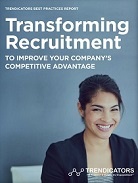
 Imagine that you’ve just been a casualty of the latest round of layoffs at your company. It’s been a while since you have conducted a job search, but after several rounds of applications and initial interviews, you receive an offer from two potential employers:
Imagine that you’ve just been a casualty of the latest round of layoffs at your company. It’s been a while since you have conducted a job search, but after several rounds of applications and initial interviews, you receive an offer from two potential employers:
- Company A knocked the candidate experience out of the park with frequent, informative communication, a reasonable time frame for the interview process and intentional, timely interviews.
- Company B dragged out the application process, left you waiting long past your scheduled interview time, and was incommunicado for weeks at a time after each stage of the process.
If both companies have similar cultures, responsibilities, and compensation packages, which offer will you be most likely to accept? More importantly, which company would you enjoy working for long term?
A 2017 Talent Board study found that 74% of candidates anticipate stronger relationships with employers after a great candidate experience, and 82% say they would be extremely likely to refer family and friends to the company.
The research supports what most of us already know intuitively. Candidate experience influences how future employees view your company, and that’s the first step toward building a highly engaged workforce – even before Day One.
Engagement Starts Before Day One
Our 2017 Trendicators Talent Acquisition Report found that 81% of millennials value recognition and social interaction during the hiring process even before an offer has been extended. Building relationships during the candidate experience is essential to connecting with this generation of workers, who now make up more than one-third of the total workforce.
The report also found that 58% of job seekers would consider taking a different job if their new employer didn’t interact with them during the time between accepting the offer and their first day of work. Other reasons for withdrawing from the recruiting process or leaving an employer soon after being hired include:
- Lack of respect for the candidate’s time during the interview
- An unreasonably lengthy application and interview process
- Poor rapport with the hiring manager
- Ineffective communication
The bottom line is that prioritizing engagement during the candidate process sets new employees up for satisfaction in their jobs. And that’s good news both for retention and productivity.
How to Promote Engagement During the Candidate Experience
Today’s candidates have many employment options available to them. That means employers should actively seek to attract them with positive, engaging candidate experiences. Here’s how to get started:
- Personalize the sourcing and selection process. Use candidate personas and personalized messaging to target your ideal candidates. Treating candidates as individuals rather than faceless resumes can greatly improve their initial impression of your company and culture.
- Demonstrate respect. Lack of respect is one of the most frequently cited reasons candidates don’t accept a job offer. Keep candidates informed about what’s happening during the application process, be timely with communications, and show respect for their time before, during and after the interview. Even if you decide not to hire someone, a personal email or phone call rather than a form letter – or worse, nothing at all – will leave a positive impression.
- Offer social interaction opportunities. An impressive 81% of millennials want to interact with your current employees before they accept a job. To meet this expectation, consider team interviews and online social communities where candidates can get to know the other members of your team before their first day of work. This also gives your current employees a say in who their new team members will be, which is one way to promote positive team dynamics in the future.
- Recognize achievements. Millennials also appreciate recognition during the hiring process, much more so than previous generations. Verbal praise and acknowledgement of past achievements can go a long way toward building your employer brand and establishing positive connections with candidates. After the hire, provide frequent feedback and let new employees know what impact they’re making.
A strategic, personalized candidate process is one of the best tools at your disposal for setting new hires up for long-term engagement. When they join your team, they will already feel valued and supported as they enter your onboarding process – which should, of course, also be designed to promote engagement.


